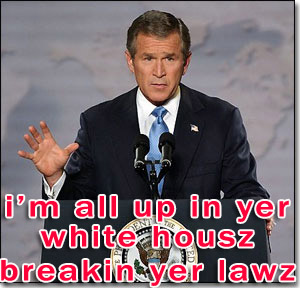 All I can say is thank any god you care to worship that this bumbling nincompoop will be out of office in less than a year. The full speech is below, but suffice to say his plan to halt CO2 emission growth by 2025 is a recipe for world wide disaster. In real terms we should halt growth in emissions in the next 5 years, and be well on our way towards carbon negative strategies by 2025. I guess when you are as tied to big carbon (and as stupid) as Bush you can’t really propose any real plan. What would Exxon think?
All I can say is thank any god you care to worship that this bumbling nincompoop will be out of office in less than a year. The full speech is below, but suffice to say his plan to halt CO2 emission growth by 2025 is a recipe for world wide disaster. In real terms we should halt growth in emissions in the next 5 years, and be well on our way towards carbon negative strategies by 2025. I guess when you are as tied to big carbon (and as stupid) as Bush you can’t really propose any real plan. What would Exxon think?
Bush’s speech below, try not to vomit.
—-
Thank you. Welcome. Thank you all for coming. I particularly want to thank members of my Cabinet for joining me here today in the Rose Garden.
Tomorrow represents — representatives of the world’s major economies will gather in Paris to discuss climate change. Here in Washington, the debate about climate change is intensifying. Today, I’ll share some views on this important issue to advance discussions both at home and abroad.
President George W. Bush speaks on climate change during remarks from the Rose Garden Wednesday, April 16, 2008, at the White House. Said the President, “I’m confident that with sensible and balanced policies from Washington, American innovators and entrepreneurs will pioneer a new generation of technology that improves our environment, strengthens our economy, and continues to amaze the world.” White House photo by Noah Robinowitz Climate change involves complicated science and generates vigorous debate. Many are concerned about the effect of climate change on our environment. Many are concerned about the effect of climate change policies on our economy. I share these concerns, and I believe they can be sensibly reconciled.
Over the past seven years, my administration has taken a rational, balanced approach to these serious challenges. We believe we need to protect our environment. We believe we need to strengthen our energy security. We believe we need to grow our economy. And we believe the only way to achieve these goals is through continued advances in technology. So we’ve pursued a series of policies aimed at encouraging the rise of innovative as well as more cost-effective clean energy technologies that can help America and developing nations reduce greenhouse gases, reduce our dependence on oil, and keep our economies vibrant and strong for decades to come.
I have put our nation on a path to slow, stop, and eventually reverse the growth of our greenhouse gas emissions. In 2002, I announced our first step: to reduce America’s greenhouse gas intensity by 18 percent through 2012. I’m pleased to say that we remain on track to meet this goal even as our economy has grown 17 percent.
 As we take these steps here at home, we’re also working internationally on a rational path to addressing global climate change. When I took office seven years ago, we faced a problem. A number of nations around the world were preparing to implement the flawed approach of Kyoto Protocol. In 1997, the United States Senate took a look at the Kyoto approach and passed a resolution opposing this approach by a 95 to nothing vote.
As we take these steps here at home, we’re also working internationally on a rational path to addressing global climate change. When I took office seven years ago, we faced a problem. A number of nations around the world were preparing to implement the flawed approach of Kyoto Protocol. In 1997, the United States Senate took a look at the Kyoto approach and passed a resolution opposing this approach by a 95 to nothing vote.
The Kyoto Protocol would have required the United States to drastically reduce greenhouse gas emissions. The impact of this agreement, however, would have been to limit our economic growth and to shift American jobs to other countries — while allowing major developing nations to increase their emissions. Countries like China and India are experiencing rapid economic growth — and that’s good for their people and it’s good for the world. This also means that they are emitting increasingly large quantities of greenhouse gases — which has consequences for the entire global climate.
So the United States has launched — and the G8 has embraced — a new process that brings together the countries responsible for most of the world’s emissions. We’re working toward a climate agreement that includes the meaningful participation of every major economy — and gives none a free ride.
In support of this process, and based on technology advances and strong new policy, it is now time for the U.S. to look beyond 2012 and to take the next step. We’ve shown that we can slow emissions growth. Today, I’m announcing a new national goal: to stop the growth of U.S. greenhouse gas emissions by 2025.
To reach this goal, we will pursue an economy-wide strategy that builds on the solid foundation that we have in place. As part of this strategy, we worked with Congress to pass energy legislation that specifies a new fuel economy standard of 35 miles per gallon by 2020, and requires fuel producers to supply at least 36 billion gallons of renewable fuel by 2022. This should provide an incentive for shifting to a new generation of fuels like cellulosic ethanol that will reduce concerns about food prices and the environment.
We also mandated new objectives for the coming decade to increase the efficiency of lighting and appliances. We’re helping states achieve their goals for increasing renewable power and building code efficiency by sharing new technologies and providing tax incentives. We’re working to implement a new international agreement that will accelerate cuts in potent HCFC emissions. Taken together, these landmark actions will prevent billions of metric tons of greenhouse gas emissions from entering the atmosphere.
 These objectives are backed by a combination of new market-based regulations, new government incentives, and new funding for technology research. We’ve provided billions of dollars for next generation nuclear energy technologies. Along with the private sector, we’ve invested billions more to research, develop and commercially deploy renewable fuels, hydrogen fuel cells, advanced batteries, and other technologies to enable a new generation of vehicles and more reliable renewable power systems.
These objectives are backed by a combination of new market-based regulations, new government incentives, and new funding for technology research. We’ve provided billions of dollars for next generation nuclear energy technologies. Along with the private sector, we’ve invested billions more to research, develop and commercially deploy renewable fuels, hydrogen fuel cells, advanced batteries, and other technologies to enable a new generation of vehicles and more reliable renewable power systems.
In 2009 alone, the government and the private sector plan to dedicate nearly a billion dollars to clean coal research and development. Our incentives for power production from wind and solar energy have helped to more than quadruple its use. We have worked with Congress to make available more than $40 billion in loan guarantees to support investments that will avoid, reduce, or sequester greenhouse gas emissions or air pollutants. And our farmers can now compete for substantial new conservation incentives to restore land and forests in ways that help cut greenhouse gases.
We’re doing a lot to protect this environment. We’ve laid a solid foundation for further progress. But these measures — while these measures will bring us a long way to achieving our new goal, we’ve got to do more in the power generation sector. To reach our 2025 goal, we’ll need to more rapidly slow the growth of power sector greenhouse gas emissions so they peak within 10 to 15 years, and decline thereafter. By doing so, we’ll reduce emission levels in the power sector well below where they were projected to be when we first announced our climate strategy in 2002.
There are a number of ways to achieve these reductions, but all responsible approaches depend on accelerating the development and deployment of new technologies.
As we approach this challenge, we face a growing problem here at home. Some courts are taking laws written more than 30 years ago — to primarily address local and regional environmental effects — and applying them to global climate change. The Clean Air Act, the Endangered Species Act, and the National Environmental Policy Act were never meant to regulate global climate. For example, under a Supreme Court decision last year, the Clean Air Act could be applied to regulate greenhouse gas emissions from vehicles. This would automatically trigger regulation under the Clean Air Act of greenhouse gases all across our economy — leading to what Energy and Commerce Committee Chairman John Dingell last week called, “a glorious mess.”
If these laws are stretched beyond their original intent, they could override the programs Congress just adopted, and force the government to regulate more than just power plant emissions. They could also force the government to regulate smaller users and producers of energy — from schools and stores to hospitals and apartment buildings. This would make the federal government act like a local planning and zoning board, have crippling effects on our entire economy.
Decisions with such far-reaching impact should not be left to unelected regulators and judges. Such decisions should be opened — debated openly; such decisions should be made by the elected representatives of the people they affect. The American people deserve an honest assessment of the costs, benefits and feasibility of any proposed solution.
This is the approach Congress properly took last year on mandatory policies that will reduce emissions from cars and trucks, and improve the efficiency of lighting and appliances. This year, Congress will soon be considering additional legislation that will affect global climate change. I believe that Congressional debate should be guided by certain core principles and a clear appreciation that there is a wrong way and a right way to approach reducing greenhouse gas emissions. Bad legislation would impose tremendous costs on our economy and on American families without accomplishing the important climate change goals we share.
The wrong way is to raise taxes, duplicate mandates, or demand sudden and drastic emissions cuts that have no chance of being realized and every chance of hurting our economy. The right way is to set realistic goals for reducing emissions consistent with advances in technology, while increasing our energy security and ensuring our economy can continue to prosper and grow.
The wrong way is to sharply increase gasoline prices, home heating bills for American families and the cost of energy for American businesses.
The right way is to adopt policies that spur investment in the new technologies needed to reduce greenhouse gas emissions more cost-effectively in the longer term without placing unreasonable burdens on American consumers and workers in the short term.
The wrong way is to jeopardize our energy and economic security by abandoning nuclear power and our nation’s huge reserves of coal. The right way is to promote more emission-free nuclear power and encourage the investments necessary to produce electricity from coal without releasing carbon into the air.

The wrong way is to unilaterally impose regulatory costs that put American businesses at a disadvantage with their competitors abroad — which would simply drive American jobs overseas and increase emissions there. The right way is to ensure that all major economies are bound to take action and to work cooperatively with our partners for a fair and effective international climate agreement.
The wrong way is to threaten punitive tariffs and protectionist barriers, start a carbon-based global trade war, and to stifle the diffusion of new technologies. The right way is to work to make advanced technology affordable and available in the developing world — by lowering trade barriers, creating a global free market for clean energy technologies, and enhancing international cooperation and technology investment.
We must all recognize that in the long run, new technologies are the key to addressing climate change. But in the short run, they can be more expensive. And that is why I believe part of any solution means reforming today’s complicated mix of incentives to make the commercialization and use of new, lower emission technologies more competitive. Today we have different incentives for different technologies — from nuclear power, to clean coal, to wind and solar energy. What we need to do is consolidate them into a single, expanded program with the following features.
First, the incentive should be carbon-weighted to make lower emission power sources less expensive relative to higher emissions sources — and it should take into account our nation’s energy security needs.
Second, the incentive should be technology-neutral because the government should not be picking winners and losers in this emerging market.
Third, the incentive should be long-lasting. It should provide a positive and reliable market signal not only for the investment in a technology, but also for the investments in domestic manufacturing capacity and infrastructure that will help lower costs and scale up availability.
Even with strong new incentives, many new technologies face regulatory and political barriers. To pave the way for a new generation of nuclear power plants, we must provide greater certainty on issues from licensing to responsible management of spent fuel. The promise of carbon capture and storage depends on new pipelines and liability rules. Large-scale renewable energy installations are most likely to be built in sparsely populated areas — which will require advanced, interstate transmission systems to deliver this power to major population centers. If we’re serious about confronting climate change, then we have to be serious about addressing these obstacles.
If we fully implement our new strong laws, adhere to the principles that I’ve outlined, and adopt appropriate incentives, we will put America on an ambitious new track for greenhouse gas reductions. The growth in emissions will slow over the next decade, stop by 2025, and begin to reverse thereafter, so long as technology continues to advance.
Our new 2025 goal marks a major step forward in America’s efforts to address climate change. Yet even if we reduced our own emissions to zero tomorrow, we would not make a meaningful dent in solving the problem without concerted action by all major economies. So in connection with the major economies process we launched, we’re urging each country to develop its own national goals and plans to reduce greenhouse gas emissions.
Like many other countries, America’s national plan will be a comprehensive blend of market incentives and regulations to reduce emissions by encouraging clean and efficient energy technologies. We’re willing to include this plan in a binding international agreement, so long as our fellow major economies are prepared to include their plans in such an agreement. We recognize that different nations will design different strategies, with goals and policies that reflect their unique energy resources and economic circumstances. But we can only make progress if their plans will make a real difference as well.
The next step in the major economies process is a meeting this week in Paris — and I want to thank my friend, President Sarkozy, for hosting it. There, representatives of all participating nations will lay the groundwork for a leaders’ meeting in conjunction with the G8 summit in July. Our objective is to come together on a common approach that will contribute to the negotiations under the U.N. Framework Convention of global climate once the Kyoto Protocol expires in 2012. This approach must be environmentally effective and economically sustainable.
To be effective, this approach will — this approach will require commitments by all major economies to slow, stop, and eventually reverse the growth of greenhouse gas emissions. To be economically sustainable, this approach must foster the economic growth necessary to pay for investments in new technology and to raise living standards. We must help countries in the developing world gain access to the technologies, as well as financing that will enable them to take a lower carbon path to economic growth.
And then there will be the major economies leader meeting in July — that’s the one I’ll be going to — where we will seek agreement on a long-term global goal for emissions reductions, as well as an agreement on how national plans will be part of the post-2012 approach. We’ll also seek to increase international cooperation among private firms and governments in key sectors such as power generation, auto manufacturing, renewable fuels, and aluminum and steel.
We will work toward the creation of an international clean technology fund that will help finance low-emissions energy projects in the developing world. We’ll call on all nations to help spark a global clean energy revolution by agreeing immediately to eliminate trade barriers on clean energy goods and services.
The strategy I have laid out today shows faith in the ingenuity and enterprise of the American people — and that’s a resource that will never run out. I’m confident that with sensible and balanced policies from Washington, American innovators and entrepreneurs will pioneer a new generation of technology that improves our environment, strengthens our economy, and continues to amaze the world.
Thanks for coming. (Applause.)
What a complete twat!
“The growth in emissions will slow over the next decade, stop by 2025, and begin to reverse thereafter, so long as technology continues to advance.”
Apart from the conditional nature of this comment, continued growth in emissions until 2025 at the current rate will *GUARANTEE* death to all but a few hardy species on Earth.
The more politicians speak about technology the more virulently anti-technology I get. No solution is effective unless it delivers: technology since the industrial revolution has delivered us to the brink of catastrophe.
Dear Friends,
I am imagining that the following questions are rhetorical ones.
“Why are politicians and skeptics so willing to risk their future and everyone else’s future on blindly clinging to a course of action that has a high probability of leading to a seriously crippled future? If you even suspect that global warming represents a serious risk to your survival (and we have far more than suspicion these days), why wouldn’t you do everything protect and conserve your planet?â€
It would please me to hear from others; but from my humble perspective the “answers†to these questions are all-too-obvious.
The leaders in my generation of elders wish to live without having to accept limits to growth of seemingly endless economic globalization, of increasing per capita consumption and skyrocketing human population numbers; our desires are evidently insatiable. We choose to believe anything that is politically convenient, economically expedient and socially agreeable; our way of life is not negotiable. We dare anyone to question our values or behaviors.
We religiously promote our shared fantasies of endless economic growth and soon to be unsustainable overconsumption, overproduction oand overpopulation activities, and in so doing deny that Earth has limited resources upon which the survival of life as we know it depends.
My not-so-great generation appears to be doing a disservice to everything and everyone but ourselves. We are the “what’s in it for me?†generation. We demonstrate precious little regard for the maintenance of the integrity of Earth; shallow willingness to actually protect the environment from crippling degradation; lack of serious consideration for the preservation of biodiversity, wilderness, and a good enough future for our children and coming generations; and no appreciation of the understanding that we are no more or less than human beings with “feet of clay.â€
We live idolatrously in a soon to be unsustainable way in our planetary home and are proud of it, thank you very much. Certainly, we will “have our cake and eat it, too.†We will fly around in thousands of private jets, own fleets of cars, live in McMansions, exchange secret handshakes, go to our exclusive clubs and distant hideouts, and risk nothing of value to us. Please do not bother us with the problems of the world. We choose not to hear, see or speak of them. We are the economic powerbrokers, their bought-and-paid-for politicians and the many minions in the mass media. We hold the much of the wealth and the power it purchases. If left to our own devices, we will continue in the exercise of our ‘rights’ to ravenously consume Earth’s limited resources; to expand economic globalization unto every corner of our natural world and, guess what, beyond; to encourage the unbridled growth of the human species so that where there are now 6+ billion people, by 2050 we will have 9+ billion members of the human community and, guess what, even more people, perhaps billions more in the distant future, if that is what we desire.
We are the reigning, self-proclaimed masters of the universe. We have no regard for human limits or Earth’s limitations, thank you very much. We are idolaters of the global political economy. Please understand that we do not want anyone to present us with scientific evidence that we could be living unsustainably in an artificially designed, temporary world of our own making…… a manmade world filling up with distinctly human enterprises which appear the be approaching a point in human history when global consumption, production and propagation activities of the human species become unsustainable on the tiny planet God has blessed us to inhabit….. and not to overwhelm, I suppose.
Sincerely,
Steve
SCIENTISTS ARE IGNORING GOOD SCIENTIFIC EVIDENCE
A particularly pernicious disturbance exists in the human community. ELECTIVE MUTISM is one of the great, clear and present dangers to human and environmental health. It is a worldwide “plague†in our time from which many too many in the vast community of science suffer egregiously. That elective mutism has afflicted so many in the social sciences is one thing. The family of humanity can understand, I suppose, how social scientists do not possess the most adequate expertise to speak out loudly and clearly regarding the emerging and converging global challenges derived from the human overpopulation of Earth.
On the other hand, what I find reprehensible and unbelievable is the way scientists with appropriate expertise in the physical and biological sciences, whatever their excuses, are choosing not to fullfil their professional responsibilities and not to discharge duties only they can perform. Their willful refusal to comment on good scientific evidence of the human species’ overpopulation of the planetary home God blesses us to inhabit is as unacceptable as it is perverse.
Sincerely,
Steve
Steven Earl Salmony
AWAREness Campaign on The Human Population,
established 2001